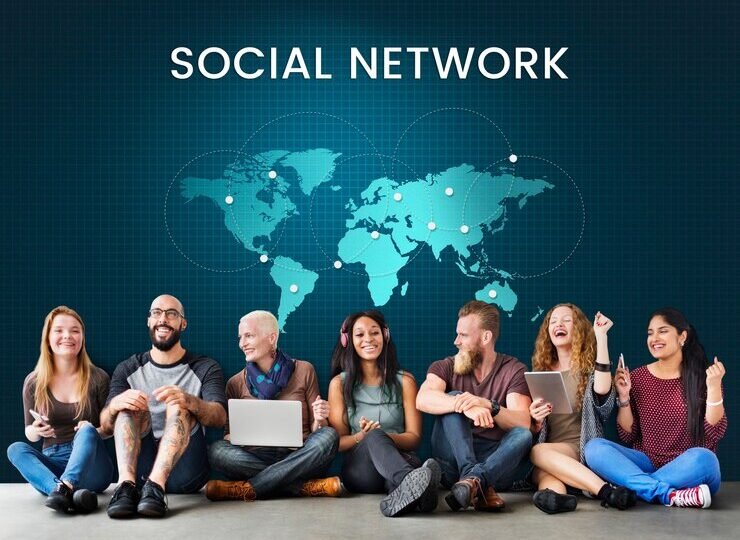Social Networks: Bridging Connections Across the Globe
September 23, 2024 | by New IP

Introduction to Social Networks
In a world where distances shrink and borders fade, social network description have emerged as the lifeline connecting us all. They allow friends to share moments in real-time, families to stay connected across continents, and strangers to become collaborators on shared passions. But what exactly is a social network? It’s more than just an online platform; it’s a vibrant tapestry woven from the threads of our interactions.
With every post, like, and comment, we contribute to this dynamic ecosystem that reflects our lives and interests. As technology continues to evolve at lightning speed, so do these platforms that shape how we communicate. Dive into the fascinating journey of social networks—from their humble beginnings to their status as global powerhouses—and discover how they bridge connections across the globe while transforming society along the way.
The Evolution of Social Networks
Social networks have come a long way since their inception. The journey began in the late 1990s with platforms like Six Degrees, which allowed users to create profiles and connect with friends. This marked the dawn of online social interactions.
As technology advanced, so did these platforms. Friendster emerged in 2002, paving the way for MySpace, which dominated in the mid-2000s by allowing extensive customization of user profiles.
The introduction of Facebook revolutionized how we interact online. Launched in 2004, it transformed from a college-exclusive site to a global phenomenon that connects billions.
With smartphones and apps becoming ubiquitous, social networks evolved further. Platforms like Instagram and Snapchat shifted focus toward visual content, catering to an ever-demanding audience craving instant connection through images and videos.
Each evolution reflects changing societal needs—a testament to our desire for communication across distances.
How Social Networks Connect People Across the Globe
Social networks serve as virtual bridges, linking individuals from diverse corners of the globe. With just a few clicks, users can interact with friends and strangers alike, transcending geographical barriers.
These platforms allow people to share experiences, ideas, and cultures in real-time. A moment captured in one part of the world can resonate instantly across continents.
Language differences diminish as images and videos convey emotions that words sometimes cannot express. Whether it’s through memes or heartfelt stories, connections flourish effortlessly.
Moreover, social networks foster community bonds among like-minded individuals who may never meet face-to-face but feel united by shared interests. This sense of belonging is invaluable in our increasingly globalized society.
Through networking events or group discussions online, friendships blossom across borders. These interactions not only enrich personal lives but also broaden perspectives on various issues impacting humanity collectively.
The Impact of Social Networks on Society
Social network description have transformed the way we communicate. They serve as platforms for instant connection and sharing ideas, breaking geographical barriers.
These digital spaces foster community engagement, allowing diverse voices to be heard. Social movements gain momentum through viral hashtags, showcasing collective power.
However, social networks also amplify misinformation. The rapid spread of false information can influence public opinion and create societal divisions.
Moreover, they affect mental health. While some find support online, others struggle with comparison and cyberbullying.
The balance between connectivity and privacy remains a pressing concern too. Users often share personal details without considering long-term consequences.
In essence, the impact is multifaceted—shaping relationships while posing challenges that society must navigate carefully.
Positive Effects of Social Networks
Social networks have revolutionized the way we communicate. They provide instant access to friends, family, and even strangers around the world. This connectivity fosters relationships that might not have flourished in our offline lives.
Moreover, these platforms serve as hubs for information sharing. Users can discover news, trends, and educational content with just a few clicks. This accessibility empowers individuals to stay informed and engaged.
Social networks are also vital for community building. People with shared interests can connect effortlessly, forming supportive environments where they share experiences and advice.
Additionally, social media plays an essential role in activism. It amplifies voices that may otherwise go unheard while mobilizing communities around important causes.
These benefits illustrate how social networks enhance interpersonal connections and promote positive societal change through interaction and collaboration.
Negative Effects of Social Networks
Social networks, while connecting people, can also foster negative experiences. One significant issue is the rise of cyberbullying. Anonymity online often emboldens individuals to harass others without facing immediate consequences.
Mental health struggles are prevalent among heavy users. Constant exposure to curated content can lead to feelings of inadequacy and anxiety. Many users compare their lives to those depicted online, resulting in unhealthy self-perception.
Privacy concerns are another drawback. Personal information shared on these platforms is vulnerable to misuse or data breaches. Users may unwittingly expose themselves to identity theft or scams.
Moreover, social networks can contribute to misinformation spread rapidly—affecting public opinion and behavior negatively. It’s easy for false narratives and conspiracy theories to gain traction in such a fast-paced environment.
Excessive screen time associated with social networking leads some individuals away from real-world interactions, creating isolation rather than fostering genuine connections.
Connecting People from Different Cultures and Backgrounds
Social networks serve as powerful bridges between diverse cultures and backgrounds. They create spaces where individuals from all walks of life can interact, share experiences, and celebrate differences.
Through platforms like Facebook, Instagram, or Twitter, users can discover traditions from around the world. A simple post about a local festival might spark curiosity in someone thousands of miles away. This exchange fosters mutual understanding.
Language barriers diminish with features like translation tools. People converse effortlessly across geographies. Sharing stories transforms strangers into friends.
Moreover, social networks encourage global movements for change. Activism transcends borders when people unite behind common causes. Each voice adds to a chorus demanding justice or equality.
These digital connections enable rich dialogues that broaden perspectives and deepen empathy among communities worldwide. Through shared narratives and collaborative efforts, cultural appreciation flourishes in ways previously unimaginable.
The Role of Social Networks in Business and Marketing
Social networks have revolutionized the way businesses engage with their customers. Platforms like Facebook, Instagram, and LinkedIn offer brands a direct line to their audience. This interaction allows companies to understand consumer preferences in real-time.
Marketing strategies have shifted significantly due to these platforms. Businesses now create targeted ads based on user behavior and interests. A well-crafted post can lead to viral success, amplifying brand visibility overnight.
Moreover, social media fosters community building around products or services. Companies can leverage user-generated content as powerful testimonials that amplify trust among potential buyers.
Analytics tools provided by social networks enable precise tracking of campaign performance. Brands can adjust strategies quickly based on data insights, ensuring they remain relevant in a fast-paced market.
These dynamics not only enhance engagement but also drive sales growth for many enterprises today.
Criticisms and Concerns Surrounding Social Networks
Social network description have changed how we communicate, but they aren’t without criticism. Many users worry about privacy issues. Personal data is often collected and sold without explicit consent.
Misinformation spreads rapidly through these platforms. False news can influence public opinion and sway elections. This raises questions about accountability.
Another concern involves mental health. Studies link heavy social media use to anxiety and depression, particularly among young people. The pressure to maintain an idealized online presence can be overwhelming.
Cyberbullying persists as a significant issue, leading to serious consequences for victims. Anonymous interactions sometimes foster toxic behavior that harms individuals and communities alike.
Addiction is another factor on the rise, with users spending countless hours scrolling through feeds instead of engaging in real-world activities or relationships. These drawbacks paint a complex picture of our digital landscape.
The Future of Social Networking: Innovations and Trends
The landscape of social networking is constantly evolving. Emerging technologies are reshaping how we connect and interact online. Virtual reality (VR) and augmented reality (AR) are gaining traction, creating immersive experiences that transcend traditional scrolling.
Artificial intelligence is also playing a pivotal role. Algorithms are becoming smarter, personalizing feeds more effectively than ever before. This tech-driven approach enhances user engagement by curating content that resonates deeply with individual preferences.
Decentralization is another trend on the rise. Platforms built on blockchain technology promise greater transparency and user control over data. This shift could redefine trust in social networks.
Moreover, niche communities will flourish as users seek connections within specific interests or values. These micro-communities offer deeper interactions compared to mainstream platforms, fostering genuine relationships based on shared passions.
As these innovations take hold, the future of social networking looks brighter yet more complex than ever before.
Conclusion
Social networks have transformed the way we connect, communicate, and interact. They serve as vital bridges linking individuals from different corners of the globe. The evolution of these platforms has not only reshaped personal relationships but also influenced various sectors such as business and marketing.
The impact of social network description on society is profound. While they offer numerous positive effects—like fostering community engagement and promoting awareness—they also pose challenges. Issues like misinformation, privacy concerns, and mental health impacts cannot be overlooked.
As we look forward to the future, innovations in social networking will continue to evolve alongside technology trends. Features that enhance user experience while addressing existing criticisms will shape how we engage with these platforms moving forward.
Social network description are more than just tools for communication; they are dynamic ecosystems shaping our daily lives in countless ways.
RELATED POSTS
View all

